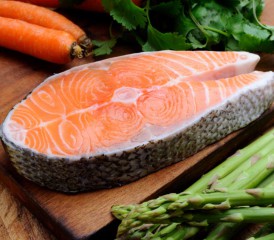Fight Mesothelioma with a Diet Rich in Omega-3

Many of us will be looking to make some changes to our diet now that the new year has kicked off.
For those diagnosed and being treated for mesothelioma, those changes aren’t necessarily the same as many others such as weight loss or eating less processed food.
While weight control and good quality foods are important, people with cancer are looking for specific foods that will protect their bodies and fight disease on a whole other level.
Omega-3 fatty acids or omega-3s are types of fats found in fish and plants. Besides being necessary for brain growth and development, these fatty acids offer the body protection from heart disease, high blood pressure, mental health disorders such as Alzheimer’s disease, digestive problems and cancer, among others.
These fatty acids are considered essential because our bodies cannot produce them.
Fish with Highest Levels of Omega-3 Fatty Acids
The most popular sources of omega-3s are cold-water fish, and no, we are not talking about that delicious fried fish that comes with a bucketful of fries.
Fish with the highest omega-3 content include:
- Anchovies
- Wild salmon
- Pacific and Atlantic mackerel
- Black cod
- Whitefish
- Bluefin tuna
- Atlantic herring
- Rainbow trout
Other seafood with moderate levels of omega-3: Mussels, white albacore tuna, halibut, pollock, farmed eastern oysters, Alaskan king crab, shrimp and scallops.
The three types of omega-3s are eicosapentaenoic acid (EPA), docosahexanoic acid (DHA) and alpha-linolenic acid (ALA).
ALA is found in plant sources such as walnuts, chia seeds, flaxseeds and walnuts, and these are all very valuable to our diet. EPA and DHA are found in marine sources.
In relation to heart health, the evidence for fish oil is quite strong and highly researched.
Omega-3s and Their Role with Mesothelioma
For mesothelioma and other cancers, most research focuses on EPA and DHA. However, there is also evidence ALA may be useful in inhibiting mesothelioma tumor progression.
The mechanism of action for EPA and DHA is its anti-inflammatory nature. Fish oil suppresses tumor growth, but further studies are needed to determine the exact mode of action and dosages needed for prevention.
For the best quality fish oil, start with fish and eat a variety to limit long-term exposure to any potential contaminants such as mercury. The amount of omega-3s will vary according to the type of fish and whether it is farmed or wild.
The concerns with farmed salmon include higher levels of contaminants, antibiotics and less omega-3 fats. Wild fish, including salmon, eat microalgae from the ocean. This algae is the original source of EPA and DHA, and it’s what makes the fish so nutritious.
The nutritional value of farmed fish will depend largely on what they are fed, which varies from soy and barley to seafood trimmings, nuts and meat byproducts.
Farmed fish may have similar levels of fat, but a poorer quality type of fat.
When possible, eat wild fish over the farmed varieties. Also, look for canned and frozen options because they tend to be cheaper and more easily available.
Omega-3 Supplements as Alternatives to Fish
For those unable to get at least two 3 ounce servings a week, a supplement would be beneficial. Be sure to check the label on supplement to determine the amount of EPA and DHA it contains.
Most 1,200 mg fish oil supplement pills actually contain about 350 mg of EPA and DHA for each pill. Certain brands have more than others and require you to take fewer pills or teaspoons (if in liquid form), so check your local stores to find one that fits your needs.
For those interested in vegetarian alternatives, look for sources of ALA such as flaxseed, flaxseed oil, walnuts and canola oil. Algal oil supplements, which are derived from algae, also deliver omega-3s, and they are suitable for anyone on a vegetarian diet.
Easy Wild Salmon Recipe
Wild salmon is among the fish that contain high amounts of omega-3s, and it’s easy to prepare.
Ingredients:
- 3 oz. piece of wild salmon
- Salt and pepper to taste
Directions:
- Heat your oven to 450 degrees.
- Season salmon with a little salt and pepper.
- Place salmon with the skin side down on a baking sheet.
- Bake for 12-15 minutes.